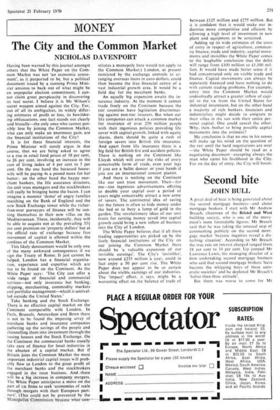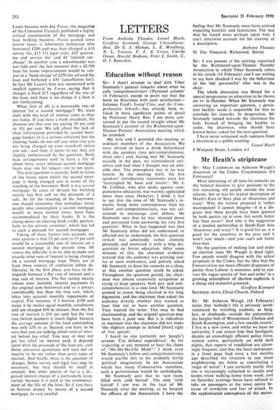Second bite
JOHN BULL
A great deal of heat is being generated about the second mortgage business—and about mortgage brokers. I start with Mr Andrew Breach, chairman of the Bristol and West building society, who is one of the move- ment's most formidable figures. Mr Breach said that he was taking the unusual step of commenting publicly on the second mort- gage market 'because inquiries reveal a dis- turbing situation'. According to Mr Breach the true rate on interest charged ranged from 18 per cent to 34 per cent. Up jumped Mr Lawrence Lewis, the managing director of a firm undertaking second mortgage business who said that second mortgage brokers 'have become the whipping boys of these auto- cratic societies' and he deplored Mr Breach's 'holier-than-thou attitude'.
But there was worse to come for Mr
Lewis because next day Focus, the magazine of the Consumer Council, published a highly critical examination of the mortgage and loan broking business. Focus quoted some horror cases—a laboratory technician who borrowed £200 and was then charged a £10 survey fee, £15 15s legal costs, £42 'guaran- tee and service fee' and £4 'interest sur- charge'. In another case a schoolmaster was not told until the last moment that a £2,500 loan for home improvements would be sub- ject to a 'bank charge' of £250 (he refused the loan and forfeited a £30 'cancellation fee'). In fact Mr Lewis's firm was mentioned with implicit approval by Focus, saying that it charges a fixed £15 regardless of the size of the loan, and there is no charge if a loan is not forthcoming.
What, first of all, is a reasonable rate_of interest for a second mortgage? We must start with the level of interest rates as they are today. If you have a bank overdraft, the chances are that you are paying 10 per cent or 101 per cent. We talk about the lack of clear information provided by second mort- gage lenders (it is a serious criticism) but the clearing banks do not tell you what rate you are being charged on your overdraft unless you ask—and then, it seems to me, they are slightly embarrassed by the question. Bank loan arrangements tend to have a life of about three years whereas second mortgage loans may run for longer—six to ten years.
The next question is security, both in terms of the house upon which the second mort- gage is being charged and in terms of the standing of the borrower. Well, it is a second mortgage. In cases of default the building society has first call on the proceeds of a sale. As for the standing of the borrower, one should remember that nowadays many people who contemplate a second mortgage would, in more normal times, have been accommodated by their banks. It is the clamp-down on clearing bank credit, particu- larly to the private customer, which has led to such a demand for second mortgages.
Taking all these factors into account, my own opinion is that 12 per cent to 15 per cent would be a reasonable rate of interest on a second mortgage at the present time. Of course the difficulty is to be able to make out exactly what rate of interest is being charged on a second mortgage loan. There are at
least three sources of confusion (often de- liberate). In the first place, you have to dis-
tinguish between a flat rate of interest and a true rate of interest. The flat variety merely relates your monthly interest payments to the original sum borrowed and so is always considerably less than the true rate, which takes into account monthly repayments of capital. For instance, if I borrow £100 and repay it by twelve equal monthly instalments and am charged £10 in interest, then the flat rate of interest is £10 per cent but the true
rate (which matters) is much highet because the average amount of-the loan outstanding
was only £50 or so. Second, you have. to be sure that you are talking about rates of inter- est before tax relief. You may or may not get tax relief on interest paid, it depends upon what the proceeds of the loan are used. Some attractive quotations will turn out on inquiry to be net rather than gross rates of interest. And finally, there is the question of charges. Some survey and legal fees may be necessary, but they should be small in amount. Any other species of fed is a di:, guised interest charge of a particularly nasty variety because it is paid at the commence- ment of the life of the loan. So if you have to borrow money by means of a second mortgage, be very careful.



































 Previous page
Previous page